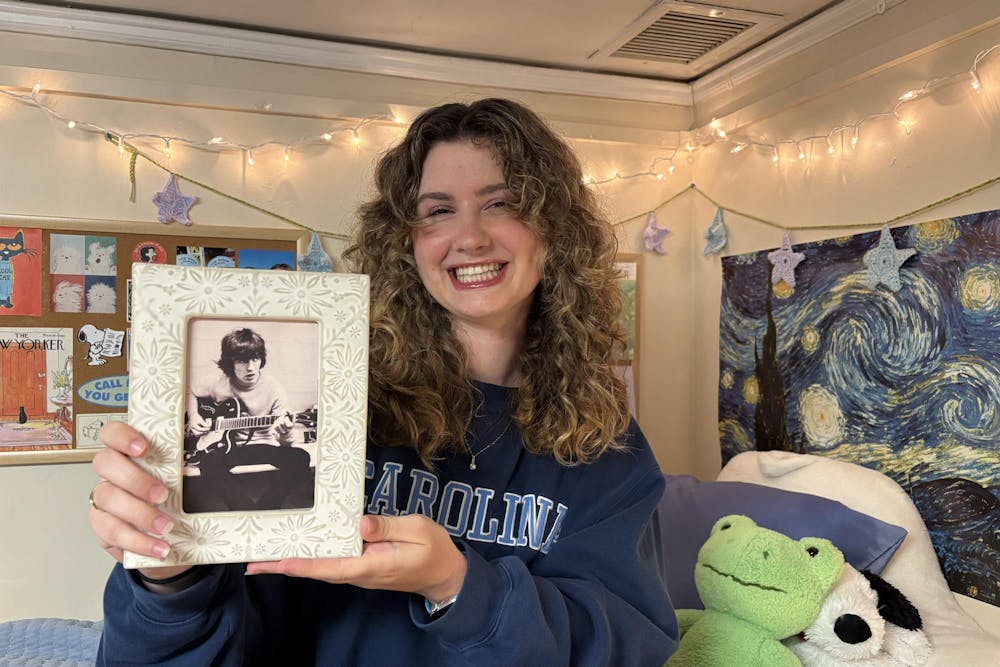When I opened Instagram last Tuesday morning, I didn’t expect to have my day immediately ruined by Barry Keoghan’s face. And yet, there he was beaming beneath an announcement of the casting for the new Beatles biopics. As I scrolled through the comments and liked every single one questioning Sabrina Carpenter’s sanity, my eyes landed on the real heartbreak: Joseph Quinn standing beside him. That’s when the terrible realization hit me: Eddie Munson is playing my beloved George Harrison.
It’s very hard to reconcile the mental image of gaudy Hellfire Club t-shirts and Metallica with the guy who was nicknamed “the quiet Beatle.” The thing about Harrison's music is that it doesn’t try to impress you. It’s not performing. It’s not begging for attention. It’s just there, waiting patiently for you to stop spiraling and hit play. His songs feel like walking into a room where no one expects you to be funny or interesting or productive — they’re just happy you showed up.
His first solo album, “All Things Must Pass,” should be considered its own emotional genre. It’s a lifeline. When the world feels overwhelming, too loud or too chaotic, I turn to this album for grounding. It's what you put on when you're lying on the floor thinking about every mistake you've made since middle school, but in a chill, enlightened kind of way. The title track, “All Things Must Pass,” feels like a soft reminder that nothing is permanent — no pain, no joy, no confusion. It’s a spiritual reckoning wrapped in a melody that stays with you long after the song ends. You don’t just hear it. You feel it.
“Behind That Locked Door” evokes the same feeling. The song isn’t loud or in your face. It’s the opposite. It feels like an invitation to take a breath.
“The love you are, blessed with / This world's waiting for / So, let out your heart please, please / From behind that locked door.”
Harrison sings, and suddenly, the world feels a little more patient. It’s not just a lyric; it’s a soft nudge, asking you to let go of the walls you’ve built up. There’s this peaceful confidence in Harrison's delivery, as if to say: it’s okay to feel, to be open, to let things flow. The melody doesn’t rush either; it lets you take your time with it.
“Isn’t It a Pity” is another one that hits deep. It's a reflection on life’s inevitable disappointments, but it’s not cynical. Harrison doesn’t linger on anger or blame. Instead, he embraces the sadness and moves through it with a gentle grace that’s hard to find in music today. The way his guitar sings, with that delicate slide, echoes his message: even in the hardest moments, we can find peace.
Harrison's music isn’t just something to listen to. It is a space for reflection. His songs don’t tell you what to think or feel — they create room for you to find your own answers. His melodies are the kind that don’t need explaining. They exist in a space between the words, between the notes, where you’re left alone to understand them at your own pace. In a world that moves too fast, Harrison's music doesn’t rush. It waits for you to catch up.
And that’s why, when I need comfort, clarity or just a quiet moment to breathe, I turn to his songs. They’re not just notes strung together; they’re fragments of truth, wrapped in simplicity, but containing everything you need to get through the day. It holds space for confusion and clarity at the same time — which, coincidentally, is exactly how I will probably feel looking at Joseph Quinn in that bowl cut wig.




